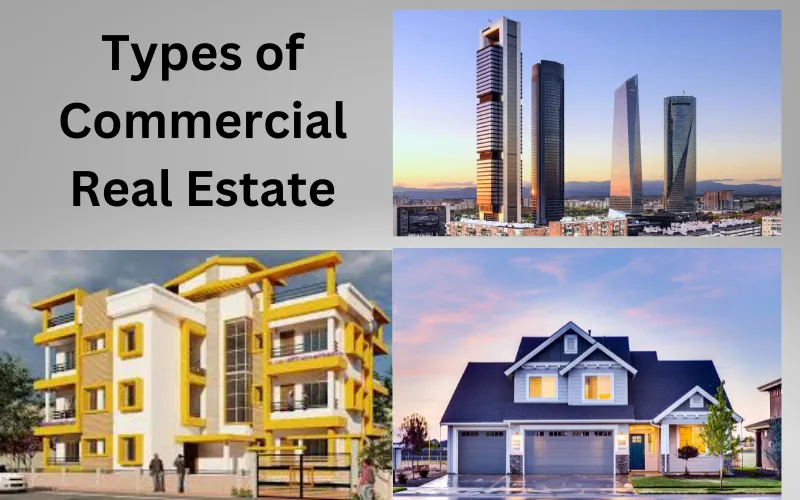A thorough understanding of commercial real estate is the base of a successful future in commercial property. That includes understanding what commercial real estate is, why it can be a more profitable investment than real estate for homes, and the various types of commercial real estate properties.
Commercial Real Estate
Property utilized only for business-related reasons or to offer a workspace, as opposed to a residence, which would be considered residential real estate, is known as commercial real estate (CRE).
Types of commercial real estate properties:
There are eight types of commercial real estate properties:
- Office
- Multifamily
- Industrial
- Retail
- Hotels/lodging
- Mixed-use
- Land
- Special purpose
Office:
Businesses can gain several advantages from having offices in commercial real estate properties. There are some important points that you should keep in mind:
- Location
- Professional Image
- Amenities and Infrastructure
- Networking Opportunities
- Scalability and Flexibility
- Lease Terms
- Investment Potential
The expenses related to renting or owning commercial office space, such as rent, maintenance fees, utilities, and property taxes, must be considered.

Multifamily:
Multifamily structures are often apartment buildings or residential complexes owned or run as a business endeavor when discussing them in commercial real estate. The points should be kept in mind:
- Income Generation
- Investment Opportunity
- Diversification
- Economies of Scale
- Professional Property Management
- Market Demand
- Regulations and Compliance
Industrial:
In commercial real estate, “industrial properties” refer to structures or establishments utilized for business activities, including manufacturing, warehousing, distribution, R&D, or logistics.
Consideration of industrial assets requires rigorous due diligence, market study, and financial assessment, just like with any commercial real estate investment.
Retail:
In commercial real estate, “retail properties” refers to structures or areas that retailers utilize, such as shops, boutiques, malls, and outlets. The following points should remember:
- Tenant Mix
- Location
- Lease Structure
- Tenant-Driven Improvements
- Physical Design and Amenities
- Foot Traffic and Consumer Base
- Seasonal and Cyclical Nature
- E-commerce Impact
Hotels\Lodging:
When considering hotels and lodging facilities in commercial real estate, it’s important to keep the following in mind:
- Property types
- Operations and services
- Location
- Market segments
- Revenue Generation
- Franchise opportunities
- Seasonality and Demand Patterns
- Management and Operations
- Technology and Innovation

It’s important to consider consumer preferences, brand affiliations, market demand, property placement, and potential dangers related to the hotel sector.
Mixed-use:
A structure, complex, or region that combines two or more diverse real estate uses to describe commercial real estate as a “mixed-use property.”
Analyzing the market thoroughly, comprehending local laws, and considering the unique dynamics of each use within the development are all necessary when investing in mixed-use properties. Evaluation of the potential dangers and rewards of mixed-use investments in commercial real estate requires extensive due diligence, financial analysis, and a market demand evaluation.
Land:
Land is a term used to explain undeveloped or vacant land parcels meant for commercial use or development. The market, regulatory landscape, and investment viability must all be carefully considered before purchasing land for commercial development. Making educated decisions about land investments in commercial real estate requires rigorous due diligence, collaborating with experts like land use attorneys and environmental consultants, and understanding local market dynamics.
Special case:
A special-purpose commercial building is one that, as its name suggests, is constructed for a particular specialized function that could not fall under any of the other categories mentioned above. Sports arenas, amusement parks, self-storage facilities, residence halls for students, zoos, and bowling alleys are a few examples of special-purpose commercial properties.
Commercial real estate USA:
Office buildings, shopping malls, industrial complexes, hotels, multifamily homes, and mixed-use developments are all examples of properties referred to as commercial real estate in the USA.
The potential for better cash flow is one of the reasons commercial real estate properties are cited as one of the best real estate investment types.
Residential real estate consists of only single- and multifamily structures, whereas commercial real estate includes all properties leased for commercial purposes.